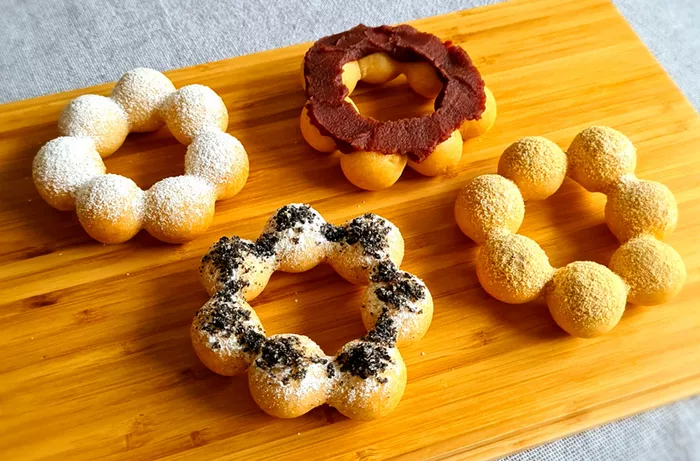In the realm of sweet treats, few desserts rival the timeless appeal of donuts. With their sugary glaze and comforting texture, they hold a special place in our hearts and bellies. Yet, as health-conscious eating becomes more prevalent, many are questioning whether their favorite indulgence can be enjoyed with fewer regrets. Enter the Mochinut donut—a novel twist on the classic that has intrigued both foodies and health enthusiasts alike. But is this trendy treat really healthier than traditional donuts? In this comprehensive exploration, we’ll examine the ingredients, preparation methods, nutritional profiles, and health benefits of Mochinut donuts compared to their classic counterparts to answer this delicious question.
What Are Mochinut Donuts?
The Origin of Mochinut
Mochinut donuts are a modern innovation blending two beloved culinary traditions: Japanese mochi and American donuts. The mochi dough, made from glutinous rice flour, lends a unique chewy texture to these treats. Originally hailing from Korean and Japanese cuisines, mochi has found its way into various dessert forms. The Mochinut donut takes this chewy, elastic dough and shapes it into the familiar ring of a donut, often with a sweet glaze or topping. For entrepreneurs eager to capitalize on the Mochinut craze, Mochinut Franchise offers an enticing opportunity to become part of a booming culinary movement. Initial Mochinut franchise costs typically range from $50,000 to $100,000, depending on factors such as location and market demand.
Ingredients and Preparation
Mochinut donuts are typically crafted from a combination of glutinous rice flour, regular flour, sugar, and other standard donut ingredients. The dough is often mixed, shaped, and fried similarly to traditional donuts, but the key difference lies in the primary flour used. Glutinous rice flour, also known as sweet rice flour, is used in place of or alongside wheat flour, creating a distinctively chewy texture.
Nutritional Breakdown: Mochinut vs. Traditional Donuts
Traditional Donuts: A Classic Profile
Traditional donuts, whether yeast-raised or cake-style, are made with a base of wheat flour, sugar, eggs, and butter. They are typically fried in oil, which contributes to their crispy exterior and soft interior. The nutritional content of a standard donut varies depending on its size and type, but on average, a single glazed donut contains approximately:
- Calories:250-300
- Total Fat:12-15 grams
- Saturated Fat:3-5 grams
- Cholesterol:30-50 milligrams
- Sugar:10-15 grams
- Protein:3-4 grams
Mochinut Donuts: A Comparative Analysis
Mochinut donuts, while similar in some respects to traditional donuts, offer a different nutritional profile due to the inclusion of glutinous rice flour. This flour is higher in carbohydrates but lower in fat compared to wheat flour. A typical Mochinut donut might contain:
- Calories:200-250
- Total Fat:8-12 grams
- Saturated Fat:2-4 grams
- Cholesterol:20-30 milligrams
- Sugar:8-12 grams
- Protein:2-3 grams
While the calorie content of Mochinut donuts is comparable to traditional donuts, they generally have slightly less fat and cholesterol. The difference in sugar content may vary depending on the specific recipe and toppings used.
see also: What Food Group Are Mochinut Donuts in?
Health Considerations: A Closer Look
Glutinous Rice Flour vs. Wheat Flour
Glutinous rice flour, the star ingredient in Mochinut donuts, has a higher carbohydrate content than wheat flour but is lower in fat. This can make Mochinut donuts a slightly better option for those managing their fat intake. However, the high carbohydrate content should still be considered, especially for individuals monitoring their carbohydrate consumption.
Lower Fat Content
The reduced fat content in Mochinut donuts can be attributed to the absence of butter in the dough, as well as the possibility of using less oil during frying. Lower fat content can be beneficial for heart health and overall weight management.
Sugar Levels
The sugar content in Mochinut donuts is often lower compared to traditional donuts, though this can vary with the type of glaze or toppings applied. Reduced sugar can help in managing blood sugar levels and reducing overall calorie intake.
Flavor and Texture: The Sensory Experience
Chewy vs. Crispy
One of the most distinctive features of Mochinut donuts is their chewy texture. This is a result of the glutinous rice flour, which provides a unique mouthfeel compared to the traditional crispy exterior and soft interior of regular donuts. This chewy texture can be particularly appealing to those who enjoy a denser, more substantial bite.
Taste and Satisfaction
Despite the differences in texture, Mochinut donuts maintain the sweetness and flavor that make traditional donuts so irresistible. The choice between a Mochinut and a traditional donut often comes down to personal preference for texture and flavor. The Mochinut’s unique chewiness offers a different sensory experience that some find satisfying.
Healthier Alternatives: Beyond Mochinut
Baked Donuts
For those seeking a healthier alternative, baked donuts present a viable option. By eliminating the frying process, baked donuts typically have lower fat and calorie content. They are made with similar ingredients but do not absorb oil, resulting in a lighter treat.
Gluten-Free and Reduced Sugar Options
For individuals with dietary restrictions, gluten-free donuts made with alternative flours (such as almond or coconut flour) can be a suitable choice. Additionally, donuts made with reduced or alternative sweeteners can cater to those monitoring their sugar intake.
Conclusion: Making the Healthier Choice
In conclusion, while Mochinut donuts do offer some health benefits over traditional donuts, such as reduced fat and cholesterol, they are not a panacea for all dietary concerns. Their unique chewy texture and lower fat content make them an appealing option for those looking to enjoy a sweet treat with slightly fewer calories and fats. However, it is essential to remember that all donuts, including Mochinut varieties, should be enjoyed in moderation as part of a balanced diet.
Choosing a Mochinut donut can be a delightful and potentially healthier indulgence, but the best approach is to make informed choices and consider the broader context of your overall diet. Whether you prefer the chewy appeal of Mochinut or the classic crispiness of traditional donuts, understanding the nutritional aspects can help you enjoy your treats without compromising your health goals.

